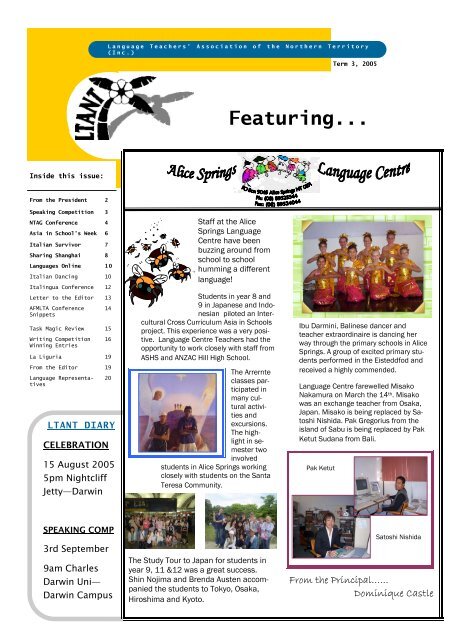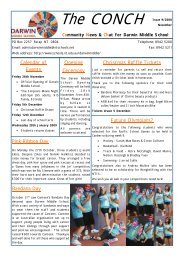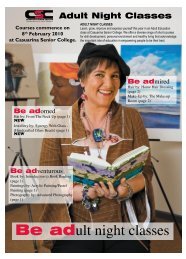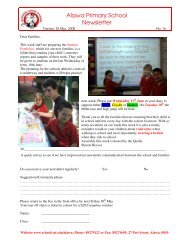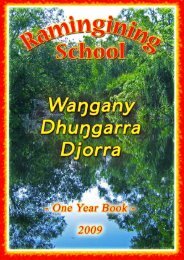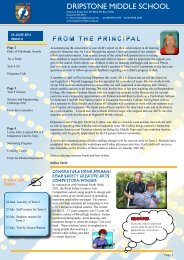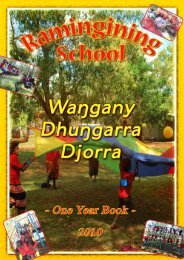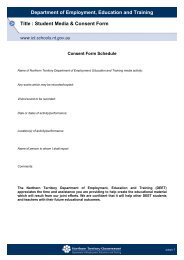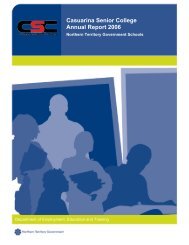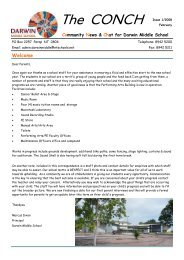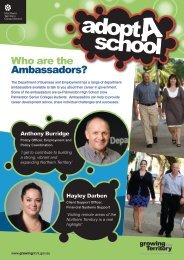Featuring... - Northern Territory Schools
Featuring... - Northern Territory Schools
Featuring... - Northern Territory Schools
You also want an ePaper? Increase the reach of your titles
YUMPU automatically turns print PDFs into web optimized ePapers that Google loves.
Page 2Dear Languages Educators,For over two years now we have been waitingfor DEET’s response to the Review of LanguagesLearning in the NT undertaken in 2003by Jim Dellit,. In his report, Connecting Cultures(J. Dellit, May 2003), Dellit acknowledges the NTas a languages-rich environment with the potentialto make the <strong>Territory</strong> a Leading languageseducation system in Australia. The report considerscurrent provision of languages in schools,NTSOL and ASLC, and specifically commentson the growth of Indigenous languages learningas an area of outstanding potential for the NT.At last, with release of the NATIONAL PLANFOR LANGUAGES EDUCATION IN AUSTRA-LIAN SCHOOLS 2005 – 2008, we are seeingsome action! The four-year Plan is intended asa basis for a shared commitment to action by allStates and Territories, and all have signed off onit.In the NT, Catherine Greene has recently takenup her new position as Languages Project Manager,with a brief over an eighteen-month periodto develop an operational model for the DarwinLanguage Centre and Alice Springs LanguageCentre, and an NT strategic plan for Languageslearning. We welcome Cath as an experiencededucator with extensive project managementexperience at Sanderson High and Anzac HillHigh School in Alice Springs, and as a newmember of LTANT.By now, your school should have received acopy of the National Plan. You can alsodownload a copy of the National Plan from theMCEETYA website at http://www.mceetya.edu.au/public/languageeducation.htmI encourage you to familiarise yourself with themain ideas of this Plan. The NT governmenthas committed to its implementation, and as languageseducators it is in our interest to be ableto contribute to informed debate on future directionsfor languages in the NT.It is undoubtedly a future of change, of ICT asan integral tool for languages learning, Interac-tive Distance Learning models, and expansionof ‘traditional’ languages (for example, German,Indonesian, Japanese) learning to include agrowing list of Indigenous Australian Languagesin programs aimed at languages maintenance,revival or awareness.We welcome members’ comments on the NationalPlan or future directions for Languages forinclusion in the October Newsletter. Furthermore,there are plenty of actual examples of excellentlanguages learning delivery happeningnow in NT schools, so hit the keyboards and thedigi camera and share what you are doing inyour school with us all, please!LTANT Sunset drinks on the Nightcliff ForeshoreTuesday 16th August, 5pm till darkPlease join your LTANT executive and LanguageRepresentatives at the Nightcliff Foreshore(see map) to meet some new faces,greet some old ones, and celebrate the launchof our new website for LTANT. A welcome drink(champagne, beer or soft drink) and nibbles areprovided. Partners are welcome, and there isplenty of space for kids to run around.Exchange and visiting teachers from Indonesia,Japan and China will also be there.See you next Tuesday around 5pm on the foreshore!Best RegardsRuth RynehartLanguage skills and cultural sensitivitywill be the currency of the [new] worldorder.Major General Peter Cosgrove
Page 3NT Languages Speaking CompetitionSaturday 3 SeptemberNo it’s not too late if you haven’t yet registered your students for this great morningof languages speaking, to be held once again at Charles Darwin University(Casuarina) in buildings near the Chinese Gardens.There are many who have already completed final registration. There are videoentries from Alice Springs, as well as primary and secondary entries from Darwinin seven schools and seven languages. However, there are many more schoolsstill to register.Please join us for what promises to be yet another vibrant celebration of languageslearning in the NT with students, parents and teachers enjoying the venue,competition and fun atmosphere of our Third Annual Languages Speaking Competition.A reminder that the $2.00 per entrant fee is due with final registration. This contributesto some of the costs incurred by LTANT for this event, such as printing, refreshmentsand prizes. Charles Darwin University has kindly provided the venue atno cost, while local sponsors generously assist with prizes.COMPETITION DATE: Saturday 3rd SeptemberVENUE:Charles Darwin UniversityTIME:9.00 am to 1.30 pmThere are trophies for the overall winning primary school and high school.There are also individual prizes awarded at the end of the competition.For more information and registration forms, please go the LTANT website locatedat: www.schools.nt.edu.au/LTANTThe information can be downloaded from the current events section.Please email your registrations to: LTANTmail@gmail.comor fax them to : (08) 8981 2137MEMBERSHIP NOTICEThe number of people who are joining LTANT is increasing. There are still members from 2004who have not rejoined for 2005. If you require a membership form, please email LTANTmail@gmail.comor alternatively download it from the our website. Membership fees as tax deductible.They are $30.00 for the year with $20.00 of the total being your membership and magazinesfor the AFMLTA.There benefits of joining are:(1) receive the AFMLTA journal Babel, (2) receive the AFMLTA Information Bulletin,(3) join the AFMLTA Special interests groups, such as "LOTE and Technology","Languages in Primary <strong>Schools</strong>" etc. and (4) receive regular LTANT news briefs andnewsletters.
Page 4Venue: Goethe Institute, St Kilda Melbourne, 9 – 10 July.The National Australian Teachers of German meeting is timetabled to meet in the city where theAFMLTA or the National German conference run by the Goethe Institute is held each year. This year wasa really great gathering as reps from all states and territories were present.In order to be able to attend the visit to Anakie Fairy Park, I booked into the Parkview on the Park hotelon Friday night, 8 th July, sharing a room with Jean Shard, a teacher from Bega in NSW, and the NSWrep. I found it really good to get to know her before the conference and to be able to talk about ourteaching of German situations in the two states.Saturday, 9 th July9 am – 2 pm Trip to Anakie Fairy Park.The bus trip lasted one and a half hours there and then back, but that was ok as the people who went,from Queensland, NSW and NT had time to chat and get to know each other before the afternoon meetings.The Fairy Park is in the ‘Brisbane Ranges’ not far from Geelong. It was built by an ex-German and hiswife on the rock hills, and incorporates some of the more well known of the Grimm Fairy tales in tableauform, with figures that move, and on the press of a button, the story to listen to. The figures, sometimesalmost life-sized, were made in Germany.The German teachers’ network from Geelong has developed a work kit for schools to use when visitingthe park and for follow-up in school. We did the worksheet as we walked through the park, as studentswould. (I have bought a kit to show to other German teachers in NT.)As the original kit was designed for students physically visiting the park from their schools, the kit doesn’thave on video a virtual trip through the park. Knowing this, the two Queensland teachers spent theirwhole visit taking hundreds of photos of the tableaux to collate onto a CD for us to buy so we can use itwith the kit. What a great idea. That means we in the NT would be able to use this wonderful resourceto introduce our students to the rich heritage of German fairytale literature. This literature is slowly comingback to use in schools down south.What I really like about using fairytales in the classroom, is that they are familiar to the students and sothe language is easier to bring to them and for them to comprehend.In the afternoon the reps from the states and territories gave reports on the status of German in theirstates and territories. We discussed issues that we would like to present to the Goethe Institutes forsupport and attention.On Saturday evening the conference dinner was held in the Bayview on the Park restaurant, with theleaders of the Goethe Institutes and the German advisers from Queensland and SA attending. We farewelledPeter Blöcker who returns to his old school in Germany after supporting teachers in Queenslandand the rest of Australia (through Ausnet) for seven years.Sunday, 10 th July, 9.30 – 3.00pmThe German Consul General for Victoria addressed the meeting and remained there for the first twohours of the discussions.The secretary of NATG presented the outcomes and issues from Saturday’s reports and we had somediscussion on them.One major thing that came out from all representatives is that without support of the Goethe Instituteand Partners, German teaching would be very difficult everywhere in Australia. We are so well supportedby them in every way.
Page 5The meeting in the afternoon ended with some show and tell of materials developed by the Goethe Instituteand various states for the German classroom.The Goethe Institute is launching a book, in September on learning German ‘Bridging the World’, peopletelling their stories about why they learned German. If we know someone who learned German, especiallyyounger adults, get them to write a paragraph or two on ‘Why I learned German’ to send to Eva Schulz atthe GI in Melbourne. eva.schulz@melbourne.goethe.org (Make sure you get the person’s permission topublish the article (copyright) before sending it.)I have some brochures and documents from the conference to share with teachers of German at the nexthubgroup meeting. Please contact LTANTmail@gmail.com if you want to know more about the hubgroup.Trish Doyle(German Teacher, NTOEC and LTANT German Representative)STORYLINE UNITS:This is not a new concept but it is a little different from the regular units of work currently taught in classrooms.Jane Janlow (German Teacher, Darwin High School) has brought with her from Denmark a differentapproach to teaching storylines. The idea is not her own it has been devised by Steven Bell and it iscalled the Scottish Method. This method requires the teacher and students to build (literally) a whole unitwithin the classroom. For example, if you are studying places, build a town with all the shops and roadsand houses, etc and learn while you build. Sound exciting? Then check out this website:http://home24.inet.tele.dk/wangbrooks/index.htmWANTEDRUSSIAN teaching materials ofany kind required. Materialsmust be no longer required byowner or available for Term 4.To help please emailmelissa.kosciuk@latis.net.au___________________________Need something for your lessonsbut are not sure how toget it? Not sure if anyone hasone? Send in a description ofyour sought item and someonemay be able to help you.Roma Schulz from the Goethe Institute in Melbourne will be inDarwin on family holiday for a week in August and has offered todo a two hour in-service for German teachers on the film makingcompetition.German teachers should have been contacted by Trish Doyle withthe details. If you teach German and you have not been contacted,please emailLTANTmail@gmail.com so we can let Trish know.Date: Monday, 15 August 2005Time: 3—5 pmVenue: Darwin High School
Page 6tory many schools are cele-their communities a rangetive sensory-rich activi-students invite membersparticipate in studies ofAcross the <strong>Northern</strong> TerribratingAsian culture withof innovative and creaties.Teachers andof their communities toAsia through various cultural, literacy and numeracy events.Asia In <strong>Schools</strong> Week aims to:• Assist members of the public gain a deeper understandingof internationalism and the need to skill our studentsfor the demands of a future global workplace throughstudies of Asia;• Encourage schools to use the abundant Asian resourceswithin the community;• Celebrate, outside the classroom, through activities focussingon Asia that are linked to Literacy and Numeracy,Studies of Society and the Environment and the Arts.Events leading up to and including Education Week include:Lantern making competitionLantern-making workshops for teachers were conducted earlyin August by Luchi Santer, Nancy Aw and Khim Mills, who demonstrateda selection of Chinese and Filipino lanterns. Prizesof theatre passes will be given to students of winning lanternsthat will be are displayed at Casuarina Shopping Centre during Education Week.Asian Cook-Off competitionFor the third year, the annual Asian food cook-off competition is being held on Wednesday 31 August for teams of secondary high schoolstudents and Charles Darwin University hospitality students. The cook-off is at Darwin High School and a panel of judges will award restaurantdinner prizes for the best dishes. Thanks to Penny McIntyre from the Home Economics Faculty at Darwin High School for herbrilliant organisation of the event.Holy Family and O’Loughlin Angklung GroupA group of 15 students will perform a musical item on traditional Indonesian instruments called Angklung at the launch of EducationWeek on Monday 29 August under the direction of Indonesian language teacher, John Gawa.SOSE and Studies of Asia Awards for teachers of best practiceThe Social Educators’ Association of The <strong>Northern</strong> <strong>Territory</strong> Awards (SEANT) and the Asia In <strong>Schools</strong> Project will present awards to twoteachers for recognition of their contributions to studies of Asia and Studies of Society and Environment. Awards will include return airfareto Brisbane in January 2006 for the Social Educators Association of Australia’s Biennial National Conference.School Events include:A Cultural Activities Day that features Indonesian dances, story-telling and displays for early childhood classes at Wagaman PrimarySchool;An International Day with multi-cultural activities and a costume parade at Manunda Terrace Primary School;Year 6 students from Clyde Fenton Primary School exploring Chinese history through excursions to Pine Creek and Darwin;A whole school literacy event, ‘Novel in a Week,’ for Millner Primary School classes studying a novel-picture book depicting Asian cultureusing drama, dance, poetry and song;St Francis of Assisi years 1/2 and years 6/7 students learning how to make and decorate Chinese lanterns using calligraphy with instructorKhim Mills. This will culminate in students giving presentations about lanterns for the school community’s ‘Dinner under thestars’;A Balinese cooking demonstration by senior years students and food tasting by teachers at Sanderson High School;Rotational Asian literacy and numeracy activities at St Paul’s Primary School concluding with an Asian lunch;Year 8 students at Katherine High School performing a Peking Opera pantomime with masks created by the students;Classes at Sacred Heart Primary School focussing on a different aspects of Asian culture culminating in a final community display;An Indonesian Shadow Puppeteer performing a Wayang Kulit play at the Good Shepherd Lutheran School to stimulate students fromevery class to write and perform their own shadow puppet plays;An Indonesian Cultural Day featuring food, costumes and dance at the Holy Family Primary School and O’Loughlin Catholic College.For further information about these events, contact Jennifer Ure, Asia In <strong>Schools</strong> Project Officer on 8999 3709.
Page 7On Thursday the 2 June, 2005 the Year 8 Italian classtrekked into the wilderness of Nightcliff High for an ItalianSurvivor challenge. Survivor was to test our wits,challenge our physical health and unite us forever.At the beginning of the day the class was divided intofour teamsVerde ~ GreenRosso ~ RedNero ~ BlackViola ~ PurpleThe challenges were fun, crazy and Italian; ranging frombuilding monuments out of pasta and gummy bears (aVERY sticky activity) to directing someone blind foldedthrough a maze using only Italian (ouch).The teams did these challenges for fabulous prizes(Kinder Surprises) and immunity, which protected usfrom losing a life in the (un) lucky draw.The “hard work” was followed by the most gorgeous ItalianSpaghetti Bolognese of which some people even hadthirds of. The lunch was served in an Italian style settingwith checkered tablecloths, candles and Italian music.After the main course, gelato was served. This food wasnot for free though, at the beginning of the day 60 eurowas given to the class and they had to haggle with MsTomassi (our Italian teacher) which caused many laughsand giggles.After lunch there was an auction and we had to use ourleftover Euro to buy Italian pottery, biscuits, chocolates,beads, bracelets and bookmark, all in Italian. Onceagain it was in a crazy Italian way and left Ms Tomassisaying “mamma mia!”After the auction, Purple team had 3 lives, the Red had2, the Black had 4 and the Green had 4. A tie breakerwas called for Green and Black, Black came out victoriousand Green lost a life.Overall it was an excellent day enjoyed by all.ClaireChandlerYear 8 ItalianStudentDarwin HighSchool29th of August 2005NTSOL is holding a Performance Afternoon.This afternoon involvesall the students from each class toperform their talents in front oftheir parents, friends and otherguests.The afternoon is held at NightcliffPrimary School, Darwin. It commencesat 4.00pm sharp.All teachers and friends are encouragedto attend this afternoonof entertainment. It is a great opportunityto talk to other languageteachers and see first hand studentsenjoying learning language!For more information, contact PaulaSimeone at NTSOLon 8985 0905.
Page 8For those of you wondering how we are going with our language learning …herewith some reflectionsLanguage Learning ExperienceLearning a language, we know, takes time, commitment and energy. We weredetermined that our expectations about learning Chinese, Mandarin to be moreprecise, during our 11 week stay were realistic. We knew that, although exposedto the language, it would not just sink in through osmosis. We knew that we would need feedback in the form ofexplicit teaching to help us internalise what we were hearing and, besides, 11 weeks was not very long. Nevertheless,we hoped that our language learning would be a positive and rewarding experience and that it hasbeen.Lauren has undoubtedly experienced the greatest exposure to the language. (Unfortunately, this prime opportunitywas not accompanied by any specific teaching to make the most of such a situation.) At school, Lauren hasbeen able to hear language being used in real contexts. Much of it goes over her head but she has been activein formulating her own hypothesis as to what some words mean, and she has tested out some of these when ithas been possible. Lauren tells of the delight of her friends when she was brave enough to ask them theirnames in Chinese. She was also able to tell me in the shop what ‘mei you’ (don’t have it) meant and used thiswhen she had to tell her Science teacher that she didn’t have the text. Lauren loves the choral reading of storiesin pin yin although she can only pick out a word or two. Mathematics has been a subject where she can useher previous knowledge to give clues about the meaning and, as a result has learnt some measure wordsamongst other terminology.With only two weeks to go, Lauren’s language learning seems to have accelerated and she is trying out a fewmore phrases and committing more to memory. This is not because she is about to go home but rather because,after a number of weeks of attaining small gains in understandings here and there, some random piecesof knowledge are finally beginning to fit together like a jigsaw.The boys’ half day at Kindergarten for five days each week gave them the opportunity to hear language relatedto classroom commands, eating lunch, playing and singing. The teacher has tried to teach them a few words(this week - nose, hands, eyes, lunch and water) and takes delight in their progress. It is hard to gain a sense ofwhat they have learnt as our language discussions have not been so in depth with the boys. They do sometimessay something about what they have heard from a conversation. They certainly learned the word for ‘twins’ veryearly on as we hear this said at least 20 times each day as we walk to school. As a result, they sense there issomething special about being twins – at least in China.Kevin’s situation of being isolated in the ‘Australian Room’ at school has lead to very little exposure to language.He has however made use of his badminton time and been an active learner whenever he has been outand about with one of the teachers.I too have been isolated and frustrated as a learner of Chinese. Daily I found myself being asked about the childrenwhen walking to school so I turned to the Lonely Planet Dictionary to learn some specific words. I occasionallytried to ask someone at the Kindergarten to read out the pin yin for me to help with pronunciation and I, likeKevin, tried to take the opportunity to ask about language when out and about with the teachers from theschool.I could at least establish the fact that I was from Australia, had three children, one girl and twin boys, 7 and 4years old. Occasionally I was able to go a bit further and communicate that we lived in Shanghai, the childrenwere going to school and we were teachers. This of course depended on how much language support I wasgiven by the person I was talking to. I remember how victorious I felt when the taxi drivers started understandingwhen I said the name of our street. (In fact, I have grown so confident that I no longer cling dearly to thepiece of paper with our address written down.)
Page 9Some of the shop assistants we visit regularly take pleasure intrying to teach us the numbers and do not let us hand over justany big note to cover the amount. They get us to repeat and waituntil our expressions show understanding instead of confusion.Such little steps in a language so far removed from English seemlike major achievements to me.Unfortunately, there is much more I want to say to the people we meet and they to us but sadly we have to sufficewith a few words and lots of smiles and nods. There are some people I see daily who wave and say hello tome as though we are good friends. A lovely feeling in my isolated world.For each of us to get even this far with our language learning has involved great effort at trying to make senseof it all. When we said something in Chinese, the word would often be repeated and we were often not surewhether this was a correction of what we were saying or just reinforcement. Then there was the complication ofthe speakers’ different accents or dialects, difficult for second language speakers who are trying desperately toaccustom their ears to the tones and all the different ‘sh’, ‘s’, ‘ts’ ‘js’ sounds.The added challenge is the learning of the characters. Kevin and I have managed to learn to recognise only acouple from street signs - apart from the numbers and the sign for ‘discount’ and ‘yuen’! Lauren is talking aboutthings we don’t understand regarding stroke formation, using the Chinese labels for the different strokes of acharacter and she too has learnt her own set of characters related to her work at school – some words from herchoral reading lessons and mathematics texts.So when we are asked to ‘speak Chinese’ – where do we start? How do very beginner learners of Chinese respond?At best, we can say the greetings and some formalities, the numbers and prices. We each have somecommon language understandings and, on top of this, we each have our own small set of nouns and phrasesrelevant to our own experiences, needs and interests. Amongst others, Kevin has learnt some badmintonterms, I have learnt a little to do with talking about the family, Lauren, the language of her classes and the boysan odd collection related to Kindergarten learning.I must admit that I always held the Chinese language at a distance. It seemed such a complex language tolearn. The idea that a different tone could change the whole meaning of a word made any attempts at speakingChinese seem so ‘risky’. I am pleased to say that both Kevin and I have grown to appreciate Chinese as a languagewhich can be learned successfully by English background speakers. Its sounds no longer seem so foreignto our ears and we have enjoyed the challenge of trying to pick out one or two words we know from a conversation.I still believe that, coming from English, learning Chinese, is different to learning say French or German. Ihad, and still have, every admiration for foreign learners of Chinese and would love to learn much more myself.Living here for a year, working with Chinese people (not isolated in a room on one’s own in a school) combinedwith formal, daily Chinese lessons would be just perfect. Only nine weeks in Shanghai, after settling in and thenoften being out and about with busy sightseeing schedules to make the most of our time, has not made suchformal lessons possible. Nevertheless, our experiences have beenpositive and this is what we had hoped for our children’s sake - tohelp them develop positive attitudes towards learning anotherlanguage and towards understanding another culture through thelanguage spoken by the people of that culture. The experience ofliving in Shanghai for nine weeks has certainly been a valuableone for us all.Robyn NorthcoteParticipant on the Shanghai ExchangeDarwin High School
Page 10Around 12 months ago, the LOTE Unit in the Victorian Departmentof Education and Training released a websitetitled 'Languages Online' which contains interactive andprintable tasks for students in years 3 - 7 learning French,German, Indonesian or Italian.Currently, they are developing new activities aimed at studentin years 7 - 10. These are due for release early in2006.The site is free to all users, and can be accessed by anycomputer connected to the internet. The address is:www.eduweb.vic.gov.au/languagesonlineFor any further information about 'Languages Online'please don't hesitate to contact Jennifer Ure (The Asia in<strong>Schools</strong> Project Manager) or Stuart Miller (TheLanguages Online Project Manager).In the first week of Term 2, the Italian studentsat Darwin High School were privileged enoughto learn from a well-known Italian dance/drama teacher from Melbourne, Vince Di Mitrio.Vince travels throughout Australia holdingworkshops for Italian students, to provide a funand different way for them to immerse themselvesin the language. Simple games, activitiesand role plays were enjoyed by all and itwas a wonderful opportunity for the Year 8,Stage One Accelerated and Stage One Continuers’students to meet and mix. Finally, welearnt a traditional Italian dance and finishedthe workshop with laughs and smiles.Kelly Beneforti(student – Stage One Continuers’ class)Darwin High SchoolJennifer Ure’s Email: Jennifer.Ure@nt.gov.auStuart Miller’s Phone: (03) 9637 2073Fax (03) 9637 2060After being inspired by the workshop many Continuers, Accelerated and Year 8 students asked tobe involved in an assembly item. We danced atraditional common-folk dance called “La Quadriglia”in order to celebrate Italian National Day, which the Italians call “Il Giorno della Repubblica Italiana”.This is a very important day, which celebrates Italy becoming a Republic in 1946. It was excellent to have theYear 8s, the Year10s and Year 11 students working with each other and being brought together by the Italianlanguage and culture.We would like to thank Italingua (The Italian Teachers’ Association of the NT) for providing the Italian dancingcostumes. A massive thanks also to Ms Puri Fernandez who made all the costumes beautifully.The performance was enjoyed by all students and staff.Angela Frigerio
Page 11ADVERTISEMENTYou too can advertise yourproducts in the LTANT Newsletter.Simply contactLTANTmail@gmail.comfor member rates.If you are an Indonesian teacher in the <strong>Territory</strong>, then these documentaries may be of interest toyou. Jason Kelly went on exchange to Indonesia in 2002 and produced these documentaries as aresult of his exchange. He has created these documentaries, produced by Dingo Education Resources,specifically for the school market.Dingo Educational ResourcesEmail: wimob@ozemail.com.auPhone: 08 89454409Occupations in IndonesiaEverybody works for a living. This videocontains rare footage of Indonesians abouttheir work. See Teachers and Students,Agricultural workers, Salespeople, Ministersof religion, a Weaver, a Brick maker, aTape maker, Potters, Fishermen - includingillegals, a Salt maker, Porters, Drivers andDomestic help. Lots to discuss in Englishand Indonesian! Suitable for all ages. Commentaryin English only.VHS format. 26 minutes.Cost TBASport and Recreation in IndonesiaIndonesians enjoy sport and recreation.See rare footage of Indonesians in theirleisure time. The following topics are covered:Sport in school [Aerobics, Treasurehunt, PE]; A Running Club; Soccer; Martialarts [Perisaian, Silat]; Water recreation[Snorkelling, parasailing, Swimming andfishing]; Traditional and ContemporaryMusic and Dance; Basketball; Going out forthe day ; Going camping. Suitable for allages. Commentary in English only.VHS format. 21 minutesCost TBACooking with MarEver wanted to know the secrets to makinggreat great Indonesian curry? It’s in theherbs and spices - and the way it’s cooked!Mar introduces Indonesian spices thenshows how to make the curry paste foryellow and red curries. It will set you droolingand experimenting. The video appearsonce with an English voice over and then isrepeated in Indonesian only. Suitable for allages. The Indonesian Only section is suitablefor Year 10 and above language students.VHS format 40 minsCost TBAKawin Lari: A Lombok Love StoryMany young couples in West Lombokchoose Kawin Lari [eloping] over otherforms of marriage. This story, acted out byYear 10 students from SMUN 1 GunungSari in Lombok depicts the Kawin Lari process.The film is given once with an Englishcommentary and a second time with anIndonesian commentary. The acting is doneat a beginners level Indonesian. Two x 13minutes.Pernikahan di LombokThis film gives rare footage from Christian,Hindu and Bugis [Muslim] weddings thattook place in Lombok. The film emphasisesthat all faiths have common practices andaspirations for marriage. There is a verybrief English commentary over Indonesiansubtitles. 7 minutes. Cinta Terlarang Thisrough video gives rough footage of Year 12student Rusli and friends performing theirsong Cinta Terlarang. Enjoy the song andsee the cool dudes! Five + minutes.VHS Format. Approx 37 minutes.Cost TBAIndahnya Persahabatan: The Beauty ofFriendshipThis video drama is filmed on location inLombok. It contains rare footage of life inan Indonesian school. The actors are studentsfrom the Year 12 Video Team atSMUN 1 Gunung Sari. The C grade melodramadepicts the life of Gek who is strugglingto find acceptance among her schoolfriends. Typical of the genre it has teenagegirls arguing and being nasty to one another,a fight scene and a loving reconciliationat the end. The drama is in Indonesianslang with sections of beautiful, clear Indonesian.Language level most suitable forYear 11 and 12 Indonesian students andabove. As seen on LombokTV! All proceedsto humanitarian projects in Lombok.VHS format. 34 minutes.Cost TBAOn Exchange in IndonesiaWhat is it really like to be an exchangestudent in Indonesia? What would it be liketo stay with an Indonesian family on anexchange program? This video answersmany of your questions. Filmed at variouslocations in Lombok students and staff fromthe <strong>Northern</strong> <strong>Territory</strong> - Indonesia ExchangeProgram give their views on thatprogram. The film also includes rare footageof Indonesian households and familysituations.VHS format. 28 minutes.Cost TBAIndonesian CeremoniesIndonesians love ceremony and formality.This video depicts several Indonesianceremonies: The Ogoh - ogoh paradeduring the Balinese Hindu festival ofNyepi; The Balinese Hindu MunggahDuhur ceremony; The opening of a studentart exhibition; A Muslim CircumcisionCeremony; Celebrating Kartini Dayat school with a Flag Raising Ceremony.There is also bonus section with a singalong Indonesia Raya, the Indonesiannational anthem. This video has an Englishvoice over. However there are sectionswith clearly audible Indonesiansuitable for language students in Year 10and above.VHS format. Approximately 30 minutes.Cost TBAIndonesian WeddingsEverybody loves a wedding. The beautyand pageantry of man and woman beingjoined together. This documentary containsrare footage of Indonesian weddings.It has commentary and footagefrom Balinese Hindu and Bugis Muslimweddings. There is also Lombok SasakMuslim as well as Catholic and Protestantweddings depicted and discussed.When permission issues have been resolvedthis video will be released.VHS format. Approximately 30 minutes.Cost: TBAA Taste of IndonesiaA Taste of Indonesia is a compilation ofvideos from Dingo Educational Resourcesabout Indonesia. This valuepack includes: Sport and recreation inIndonesia [21 minutes]. Indonesian Cere-
Page 12Five NT Italian teachers recently joined with colleagues in South- ern Queensland to attend the annualCOASIT Italian teachers Professional PD, kindly funded by Italingua.Paola Simeone, Claudia Vorrasi, Andrea Keighley, Ingrid Tomassi and Laura Giannasca made the trip to the WatermarkHotel on the Gold Coast, and attended three days of lectures, discussions and practical sessions, togetherwith about forty Italian teachers from Queensland schools and institutions.Sessions were hosted by Mario ……………………. and Sandra …………………., both from the University of Venice,and experts in the field of teaching Italian to non-Italian speakers.Theory lectures included topics like the change from a behaviourist approach to language teaching, to the nowmore accepted Cognitive approach. Other topics touched on areas like the changing attitudes to teaching grammar,and different perspectives on teaching a language to foreigners, depending on their needs, and situation.Practical sessions focussed on preparing units of work for students, using some of the theoretical knowledgelearned above.As always, one of the biggest benefits of the whole exercise was the opportunity to spend 3 days with other Italianspeakers, speak the language together, and hear about some of the latest developments in Italy in relationto language teaching.Many thanks to Italingua for funding our trip, and, as always, to our beloved leader, Paola, for organising all thedetails so well. Thanks again, and we look forward to many more enjoyable conferences in the future.Andy Keighley (Italian Teacher, Palmerston High School)www.schools.nt.edu.au/ltant/The LTANT website is now up and running!! The website is in its infancy at the moment and all comments for∗∗∗∗∗∗Newsletters in electronic formUpdates on eventsRecent newsConference detailsPD detailsResults from Competitions∗∗∗Links to useful websitesContact details for languagerepresentatives and theexecutiveA list of schools and their correspondinglanguages taughtThis year’s committee members were elected at therecent AGM. The positions are as follows:(From left to right)Promotions:Secretary:President:Treasurer:Publications:Jennifer UreKylie NamRuth RynehartYumiko ShawMelissa KosciukTheir contact details can be found on page 20.
Page 13Access Asia Study Tours 2006A Professional Learning Program for EducatorsThe Asia Education Foundation invites educators toincrease their knowledge and understanding ofChina, India, Korea, Vietnam and Cambodia in 2006.For information and applications, contact JenniferUre, Asia In <strong>Schools</strong> Project Officer:jennifer.ure@nt.gov.au or Phone 8999 3709A significant issue of concern is the currentsituation regarding travel to Indonesia.‘School visits to Indonesia, teacher exchanges, and in-country professional development programs inIndonesia have all suffered from education departments’ rigid interpretation of the DFAT travel advisoriesagainst non-essential travel to Indonesia.’ (The Australian – Higher Education Supplement, DavidT. Hill, 20 July 2005)Interest in Indonesian study is suffering (despite ongoing trade and business interest and travel).School excursions to Indonesia are a significant motivating factor influencing whether or not studentschoose to maintain their Indonesian studies. A significant avenue for teachers to maintain their languageproficiency is also now no longer open. This is despite the fact that DFAT travel advisories are“advice” – not prohibition.We believe that at least professional development visits to Indonesia should be regarded as essentialand that this issue should be lobbied at all levels.Kathy Silburn and Karen Munro
Page 14The recent AFMLTA Biennial Conference was once again a valuable opportunity for professional input,information gathering, and networking. Here are a few useful items of info from some of the sessions Iattended:Audacity presented by Harald OhlendorfAudacity (Version 1.2.3) is free software from the internet which enables you to utilise audio from webradio or other sources. The Audacity software can be downloaded fromhttp://audacity.sourceforge.net . The idea is to track down on the internet a useful radio stationwhich has a web site with live streaming audio, perhaps with the help of websites such aswww.radio-locator.com . Then you can use Audacity to record programs, advertisements, announcements,news etc., which you then edit as needed, for example cutting out unnecessary parts or slowingit down, before exporting it into MP3 or WAV files to play on computer or CD player. With broadbandthe quality of this web editing software is now excellent, and very easy to use.Language Teachers’ Resource Network presented by Shannon MasonThe Language Teachers’ Resource Network (LTRN) is an online resource-sharing network where teachersof all languages share their resources. Currently there are over 300 resources, categorised into 30topics, in six different languages. Teachers are encouraged to use the resources on the site, and todonate their own, ensuring a wealth of ideas from different perspectives, saving both time and energy.Explore the site at www.languageteachers.net To donate your own resources contactshannon@languageteachers.netUsing the DVD presented by Jackie LoveThis session included a very simple tip which many of you may already know, but others may not. Andthat is, that when you are next buying a DVD player make sure you buy one that is “multizone” (notjust Zone 4 for Australia). Apparently Australian stores are not allowed to have multizone players ondisplay – you have to ask for the multizone version of the one you’ve chosen from the floor. With amultizone player you can play DVDs from other regions of the world. You can get multizone chips putinto your computer, but beware because that can cause problems and will void the warranty.Seizing the Future – Where to From Here? – Concluding PanelThis final session contained lots to inspire. I was struck by Tony Liddicoat’s view that there is a renewingof languages as “education” (i.e. not just as a skill useful for doing or gaining something else).Tony talked about the “reimagining” of languages education – no longer is languages education aboutpeople and places “out there”, but rather it’s about “me”, and issues of “being” and “belonging”,“understanding the world, oneself, and others through language”. Joe Lo Bianco went on to say thatthis orientation on “me as the learner” can help us resist the negative implications of a renewed interestglobally in language learning in order to “protect against the enemy”. Joe believes we need to emphasisethe intellectual benefits of language study, because language study generates capabilities forlearning, thinking, and knowing, all key aspects of “being”.Kathy SilburnNT School of Languages
Page 15This user friendly application was developed by Martin Lapworth – Head of Modern Languagesin a UK secondary School. Martin developed an interest in using ict in histeaching of French. He found that ready-made materials were often beyond his budgetas well as being too limited in their scope, so he began experimenting with various toolsfor creating interactive resources. Finding these existing tools time consuming for theteacher the end result uninspiring for his students.Task magic is a suite authoring tool for Modern Languages teachers. The software iseasy to use and produces multiple exercises for one set of inputs.There is a 30 day trial programme on the website:www.mdlsoft.co.ukJust follow the prompts on that web site, install the exe file and give it a go.Paula SimeoneET2 <strong>Northern</strong> <strong>Territory</strong> School Of LanguagesDid you know................?NT School of Languages runs regular Professional Learning sessions specifically designed for teachers ofall languages at all levels. These sessions are held after normal school hours, usually at Nightcliff HighSchool. There are two more sessions between now and the end of the year:Monday5 September4pm-5.30pmTuesday25 October4pm-5.30pmLanguage Specific Learning ActivitiesPick up some useful activities and strategies specific to the language you teach.(Language groups to be determined.)More Skits and Role PlaysMore strategies to get students using the language they are learning in fun and activeways.If you are interested in getting further information or booking into a session please ring Karen Munro atNTSOL on 8985 0904.
Page 16STAMP – CATEGORY ALANGUAGE LTANT WINNER LTANT HIGHLY COMMENDEDCHINESEJAPANESEITALIANELICY LAYDHSMARION CARAHERDHSELEANOR STANCOMBEDHSANNE-MARIE CHINDHSAMANDA LAYDHSLEEMARIE PERHAMDHSKIRA PARKERDHSLANA RENSHAWDHSCHARLIE MARTINDHSSARAH WINCHDHSRACHEL TOLLIDAY-HENDERSONDHSALISON DUGULDNTSOLFLYER FOR CULTURAL DISPLAY – CATEGORY BLANGUAGE LTANT WINNER LTANT HIGHLY COMMENDEDINDONESIANAMY SIERAKOWSKIDHSCATHERINE BROWNEDHSNATALIE DE GUZMANDHSCHINESENadia MahmoodDHSJAPANESE No National Entrant Selected RACHEL WAIDHSSIU QING CHAIDHSITALIANROSIE SCIACCANTSOLKELLY BENEFORTIDHSFIONA ROONEYNTSOL
Page 17
Page 18MAGAZINE ARTICLE ADVERTISING NATIONAL GALLERY – CATEGORY CLANGUAGE LTANT WINNER LTANT HIGHLY COMMENDEDCHINESEITALIANVIVIAN LIUDHSJANE MARIE LARGENTSOLAll LTANT winning entriesand highly commended entriesreceived a certificate fromLTANT and the winningentries were sent to thenational competition. We hopeto find out soon the outcomefrom the national competition.Thanks to everyone who sentin entries!!
Page 19Dear all,Well I must say that this edition has been very exciting to put together. There has much moreinterest in the newsletter this Term and as a result a larger issue with lots of exciting news.Thank you to everyone who submitted articles and a special thanks to Alice Springs LanguageCentre for their update.This edition there was one letter to the editor which is interesting and LTANT’s first full page advertisement. FurtherLetters to the Editor and comments or feedback are welcome for the next issue. To those who decide topurchase the Dingo Resources a review would be very beneficial for other LTANT members.As you may have read by now, the webpage is now up and running. I am personally very pleased that the webpageis now accessible to all language teachers in the <strong>Territory</strong>. The webpage has been completely revampedso those who remember the old webpage may be a little shocked. I am most interested in people’s impressions,comments and suggestions for improvement of the webpage and will gladly accept these using the emailfeature located on the ‘Contact Us’ page.Once again, thanks to all those who submitted articles for this newsletter. Please e-mail your suggestions aboutthe webpage and I look forward to receiving everyone's articles for the next newsletter.In anticipation,During Term 3 the Year 7 students from Holy Family PrimarySchool learned about the regions of Italy. They wereasked to do a project in the Italian language on one regionof their choice. Below is an outstanding sample ofwork from student Madison Hearnden.Zaira Tomassi (Teacher of Italian)La LiguriaLa liguria e` una di piccole regioni in Italia. Anche se e` molto piccolo e turisti vengonoa vedere le spiagge mervigliose e le montagne della Liguria.Genova e` la capitale della Liguria.Le foreste coprono la maggior parte della Liguria. Gli alberi di limone, le erbe, i fiori, lemandorle ed i pini si sviluppano continuamente. L'ordore dei fiori si sperlano dappertuttola Liguria.Le spiagge sono belle. ci sono fili sabbiosi, grotte rocciosi ed alcune spiagge con i ciottoli.Le montagne separano la Liguria da Piemonte, da Emilia Romagna e dalla Toscana. Ituristi vengono da dappertutto per vedere il paesaggio spettacolare della liguria.Madison HearndenYear 7 studentHoly Family Primary School


